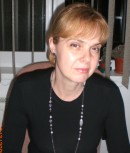
Plenary Lecture
New Competitive Technology to Develop High-Effective Energy Sources

Professor Ioana Diaconescu
Research Center for Mechanics of Machines and Technological Equipment
“Dunarea de Jos” University of Galati
Romania
E-mail: idiaconescu@ugal.ro
Abstract: This paper presents some aspects regarding the strategic aims and priorities for development of new competitive scientific products and technologies, targeted at solving global energy and ecological problems. The leading tendency is directed to substitution of the traditional hydrocarbon fuels with alternative renewable energy sources. Significant part of the research is oriented in development of high-effective ecologically friendly energy sources, based on the concept of the so-called hydrogen economy and especially with the development of new types of fuel cells.
An increasing share of the research in the field of alternative energy sources is directed to the microbiological fuel cells. They use easily accessible natural substrates, during which oxidation electricity is generated. Their great potential is determined by the combination of technologies for electricity production and simultaneous use for soil or water purification, eco-monitoring, etc.
The most perspective application of the microbiological fuel cells is an electricity generation from the aquatic sediments, rich of organic matter. These are the sediment biofuel cells. One of the major advantages of these biofuel cells is that the electricity generation from river or marine sediments contributes to purification of water from organic and in some cases from inorganic pollutions by using ecologically friendly technologies.
Most sediment fuel cells have been tested in marine environments, and only a few in fresh-water reservoirs. This is because seawater has a higher electrical conductivity than river water and it has been suggested that marine sediment fuel cells are expected to produce greater electric power than river-water ones due to a lower electrolyte resistance. Similar sediment fuel cells have been tested for powering signalization systems in the open sea areas and they have been shown stable operational characteristics for a long time.
Brief Biography of the Speaker: Ioana Diaconescu received her Master‘s degree in Electrotechnics and Energetic from Polytechnic Institute from Bucharest, in 1987. She has earned her Ph.D in Advanced Engineering Thermodynamics from “Dunarea de Jos” University-Galati, in 1998. She is recognized as mechanical engineering associate professor at the department of Technical Sciences, Machines and Drives from “Dunarea de Jos” University from Galati and she teaches mainly Thermodynamics, Heat and Mass Transfer and Electrical Drives. Since 2001 she is a senior research at the Research Center for Mechanics of Machines and Technological Equipments and she focused her research activities during the last ten years to energy saving and trigeneration, mass and heat transfer (paper drying process), exergy and energy analysis of thermal processes, irreversible processes analysis, renewable energy and energy management. She is author of three books and more than 90 scientific papers published at international conferences and journals. She is Romanian and Bulgarian evaluator for R&D projects and also European evaluator for education’s quality. Also, Ioana Diaconescu is reviewer for WSEAS papers and other prestigious journals.
Ioana Diaconescu was invited two times as visiting professor in City University of Honk-Kong-China, were developed a fruitful collaboration with Mathematical Department regarding PDEs in mass transfer issues (paper drying process).
Dr. Ioana Diaconescu is an Expert of Romanian National University Research Council – CNCSIS and also an Evaluator of the Romanian Agency for Quality Assurance in Higher Education.